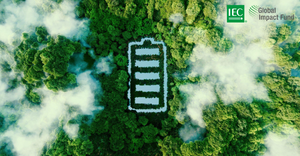Transforming old batteries into new resources in Africa
Service Detail from IEC - International Electrotechnical Commission

Award-winning clean energy company Aceleron has been selected to implement the Fund’s inaugural project “Catalyzing innovation for circular models in Africa – turning battery e-waste into e-resources”.
Recognizing the huge role that international standards and conformity assessment can play in addressing many of today’s social, economic and environmental challenges, IEC created the Global Impact Fund.
Given concerns around the environmental impact of batteries, such as mineral extraction and improper disposal, the IEC Global Impact Fund’s first project will tackle the challenge of e-waste in this area.
The global demand for batteries is expected to increase from 185 GWh in 2020 to over 2000 GWh by 2030 and, if managed correctly, will play an important role in storing more electricity for later use.
Batteries are seen as a key solution to the problem of electricity access in Sub-Saharan Africa, which has an overall electrification rate of 48.2%. Yet batteries remain expensive and complicated to maintain, resulting in significant amounts of waste.
Aceleron will use its compression lithium-ion battery technology to implement a study that makes new batteries out of old ones. Standards will be used in all aspects of the process and the batteries will then be tested at Aceleron facilities in Kenya and Uganda. Under the guidance of the Kenyan National Committee, the project will provide a use case of standardized testing for assessment in the two countries.
This will enable a standardized approach which will allow the technology to be replicated and promote battery circularity across the world.
Philippe Metzger, Secretary-General and CEO of the IEC, said: “Signing of the first project with Aceleron is an exciting step for the IEC Global Impact Fund. It will allow developing countries to directly benefit from global best practices contained in IEC work in standardization and conformity assessment. Standards and conformity assessment facilitate the interconnection, integration and interoperability of technologies as well as ensuring their safety and efficiency.”
“Through investing in the standardization of proven methods to turn battery e-waste into useful resources, we are helping to provide a foundation on which further climate mitigation initiatives can grow.”
Dr Amrit Chandan, CEO & co-founder of Aceleron said: “Off-grid solar (OGS) technologies provide life-changing access to modern energy services for communities that don’t have electricity, but the batteries that run them are most likely to fail first. The support from the IEC Global Impact Fund is a valuable opportunity to develop a sustainable way to re-use the natural resources in batteries without a negative impact on the environment.”
“The data created from the project can help further improve relevant standards, which in turn will allow this technology to grow. The result is that more communities can reap the many benefits from electrification while at the same time contributing to climate change mitigation.”
The project will run as a two-year pilot, with support from IEC national contacts, and will be actively seeking scalability and additional partners.